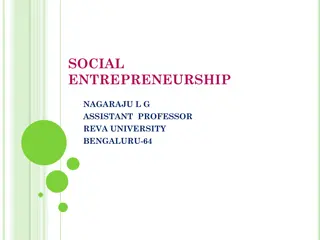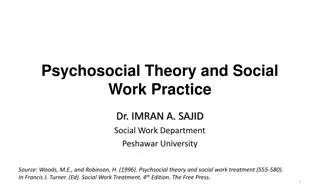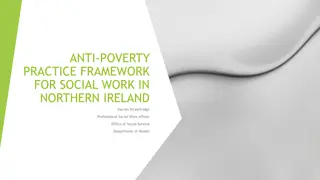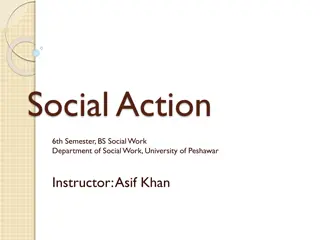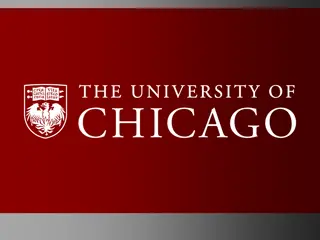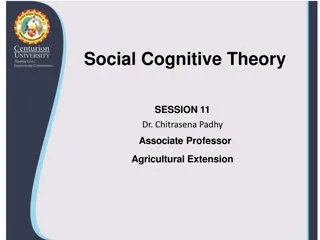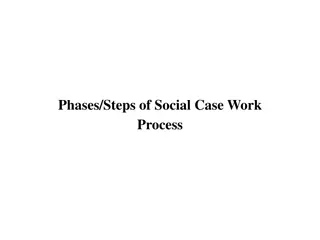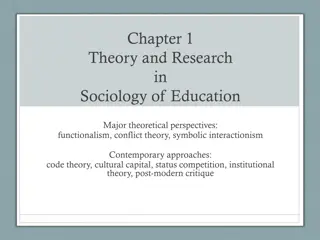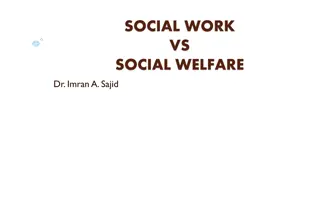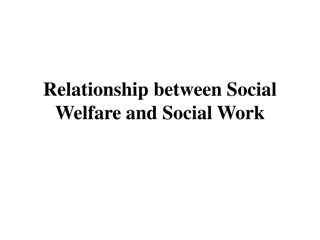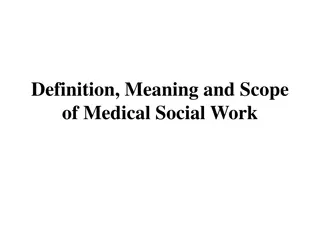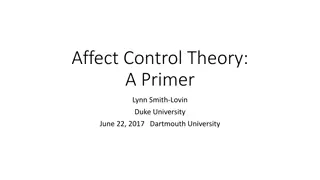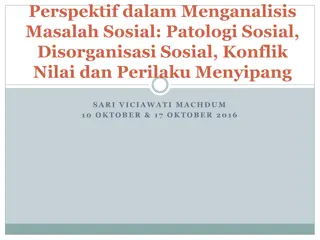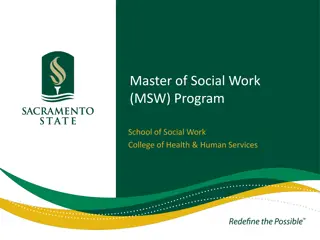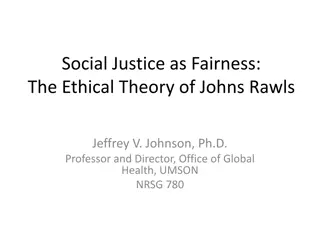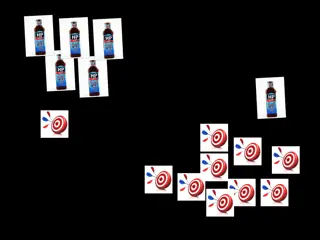Davis & Moore Theory on Social Stratification
The Davis-Moore theory argues that social inequality is necessary as it motivates talented individuals to fulfill crucial roles in society. They believed in meritocracy and unequal rewards to incentivize individuals to pursue important roles. The theory emphasizes that society rewards talent and har
3 views • 8 slides
Understanding Social Learning Theory and the Power of Example
Social Learning Theory, introduced by Bandura, emphasizes learning through observation and modeling. It explores how individuals acquire behavioral dispositions, trial-and-error experiences, and the impact of stimuli in the environment. The theory focuses on the importance of attention, retention, a
1 views • 17 slides
Understanding Social Entrepreneurship, Social Enterprise, and Social Innovation
Social entrepreneurship involves creating sustainable social impact, social enterprises address challenges in critical needs sectors, and social innovation focuses on developing effective solutions to social and environmental issues. These concepts emphasize creating social value while engaging with
2 views • 19 slides
Evolution of Mathematical Theories and Proof Systems
Development of mathematical theories such as model theory, proof theory, set theory, recursion theory, and computational complexity is discussed, starting from historical perspectives with Dedekind and Peano to Godel's theorems, recursion theory's golden age in the 1930s, and advancements in proof t
1 views • 29 slides
Psychological Theories of Criminality: Understanding the Roots
Psychological theories of criminality delve into the association between intelligence, personality, learning, and criminal behavior. Major theories include Psychodynamic Theory by Freud, Behavioral Theory by Bandura, and Cognitive Theory by Kohlberg. These theories explore how unconscious mental pro
1 views • 20 slides
Understanding Psychosocial Theory in Social Work Practice
Social work practice has always integrated psychosocial concepts to address human well-being and social functioning. Psychosocial caseworkers aim to help clients navigate challenges stemming from environmental imbalances. The term "psychosocial" refers to the interaction of psychological and societa
0 views • 27 slides
Anti-Poverty Practice Framework for Social Work in Northern Ireland
This framework emphasizes the importance of addressing poverty in social work practice in Northern Ireland. It aims to help social workers recognize and respond to the impact of poverty on individuals, families, and communities. Poverty is identified as a major social injustice, and social work prof
1 views • 13 slides
Understanding the Theory of Firms: Neoclassical vs. Modern Approaches
The theory of firms is explored through the Neoclassical and Modern perspectives. Neoclassical theory focuses on profit maximization, while Modern theory delves into managerial, principal-agent, and transaction cost theories. The discussion covers criticisms of Neoclassical theory and the essential
1 views • 79 slides
Understanding Medical Social Work and Its Impact on Patient Well-being
Medical Social Work, also known as Health Care Social Work, plays a crucial role in addressing the social, physical, and psychological needs of patients. Through providing case work, after-care, and convalescence services, Medical Social Workers contribute to reducing hospital readmissions, preventi
0 views • 12 slides
Understanding the Concept of Social Action in Professional Social Work
Social action is a crucial method in professional social work that involves organized efforts to bring about structural changes in society or prevent adverse changes. It addresses social problems like the dowry system, environmental destruction, and health issues through mobilizing masses for impact
0 views • 22 slides
Theories of Causation in Psychological and Social Sciences
Overview of theories of causation categorized into psychological, social psychological, and sociological perspectives. Psychological theories focus on instinctive, biological, and psychological qualities of abusers, including Attachment Theory, Psychodynamic Theory, Social Learning Theory, and Situa
0 views • 15 slides
Understanding Political Theory through a Contextual Approach
Exploring G.H. Sabine's perspective on political theory through a contextual approach, emphasizing the importance of historical context and societal influences. Sabine argues that while political theory evolves with its contemporary politics, it should be analyzed within its specific time and social
0 views • 9 slides
Evolution of Light Theory: From Wave Theory to Quantum Theory
At the turn of the century, the discovery of the photoelectric effect challenged the wave theory of light, leading to the development of the quantum theory by Max Planck and Albert Einstein. This new theory introduced the concept of discrete energy units known as quanta, bridging the gap between wav
1 views • 62 slides
Relevance and Limitations of Marx's Capital in Modern Social Theory
Exploring the ongoing relevance of Marx's Capital in contemporary social theory, Gary Herrigel from the Department of Political Science discusses its implications and theoretical considerations. Despite its foundational role, Marx's work also faces practical limitations, such as the challenge of tra
3 views • 14 slides
Understanding Social Cognitive Theory: Insights from Albert Bandura
Social Cognitive Theory, developed by Albert Bandura, emphasizes learning through observation and modeling behaviors. The theory explores how individuals acquire new behaviors, thoughts, and attitudes by observing others. Bandura's famous Bobo doll experiment showcased how children imitated aggressi
6 views • 17 slides
Phases and Steps of Social Case Work Process
Social case work process involves three main phases: Social Study, Social Diagnosis, and Social Treatment. The Social Study phase focuses on acquiring facts about the client's situation, while Social Diagnosis involves the professional opinion of the case worker towards a solution. Social Treatment
0 views • 7 slides
Theoretical Perspectives in Sociology of Education
Exploring major theoretical perspectives such as functionalism, conflict theory, and symbolic interactionism along with contemporary approaches like code theory, cultural capital, and status competition. The functionalist theory emphasizes social cohesion and maintaining social order through educati
3 views • 14 slides
Understanding the Difference Between Social Work and Social Welfare
Social work and social welfare are often used interchangeably, but there are distinct differences between the two. Social work involves highly trained professionals providing services to individuals and communities in need, using problem-solving methods. On the other hand, social welfare focuses on
0 views • 9 slides
Understanding the Relationship Between Social Welfare and Social Work
Social welfare and social work are interconnected concepts aimed at enhancing societal well-being. Social welfare refers to a nation's system of programs and services meeting essential needs, while social work involves professional activities supporting individuals and communities in achieving socia
0 views • 6 slides
Understanding Medical Social Work in Healthcare
Medical social work involves applying social work methods and philosophy in healthcare settings to help individuals with health and medical issues. Social workers play a vital role in various healthcare levels, from preventive care to continuing care, focusing on addressing patients' psycho-social b
1 views • 7 slides
Dp-branes, NS5-branes, U-duality, and M-Theory Overview
Overview of Dp-branes, NS5-branes, and U-duality derived from nonabelian (2,0) theory with Lie 3-algebra. Introduction to M-theory, including M2-branes and M5-branes in the strong coupling limit. Discussion on BLG theory, Lorentzian Lie 3-algebra, and the ABJM theory for M2-branes.
1 views • 32 slides
Innovations in Social Work Research: Emerging Topics and Paradigms
Explore the latest trends in social work research at the 2016 Joint World Conference on Social Work, Education, and Social Development. Discover topics such as global change, indigenous concerns, and migration issues. Delve into research paradigms, methodologies, and challenges, including the impact
0 views • 8 slides
Advancement of Social Work in Post-Soviet Countries Conference
The 4th Conference on Advancement of Social Work in Post-Soviet Countries discussed future strategies for social work education, emphasizing the importance of developing knowledge domains, educating social workers, providing services, research, and policy-making. It highlighted the interdisciplinary
0 views • 19 slides
Understanding Time-Independent Perturbation Theory in Quantum Mechanics
Perturbation theory is a powerful tool in solving complex physical and mathematical problems approximately by adjusting solutions from a related problem with known solutions. This theory allows for more accurate approximate solutions by treating the difference as a small perturbation. An example inv
0 views • 19 slides
Ethical Theories: Divine Command vs. Virtue Theory Explained
Divine Command Theory asserts that morality is derived from God's commands, contrasting with Virtue Theory which focuses on developing moral virtues to achieve human flourishing and excellence. Divine Command Theory relies on religious texts, while Virtue Theory emphasizes the cultivation of virtues
0 views • 24 slides
Understanding Affect Control Theory in Social Science: A Primer
Affect Control Theory explores how individuals maintain an orderly society through repeated actions. This primer delves into the theory's elements, the intellectual terrain of the 1960s, addressing questions on societal order, and the control principle. It also highlights the theory's scope conditio
0 views • 40 slides
Understanding Fermi Liquid Theory in Interacting Fermion Systems
Fermi liquid theory, also known as Landau-Fermi liquid theory, is a theoretical model that describes the normal state of metals at low temperatures. Introduced by Landau and further developed by Abrikosov and Khalatnikov, this theory explains the similarities and differences between interacting ferm
0 views • 23 slides
Understanding Social Issues through Theory and Perspectives
Social theory is a system of interconnected ideas that organizes knowledge about the social world. It helps us analyze social problems like social pathology, disorganization, conflicts in values, and deviant behaviors. Differentiating theory, perspective, and model, it's key to note that theories pr
0 views • 37 slides
Social Work Education in Kyrgyzstan: Challenges and Achievements
Kyrgyzstan faces challenges and celebrates achievements in the field of social work education. The Association of Social Work Alumni in the Kyrgyz Republic has been instrumental in advancing the profession. With the establishment of the Social Work Department at Bishkek Humanitarian University in 19
0 views • 9 slides
MSW Program at School of Social Work: Overview and Requirements
The Master of Social Work (MSW) Program at the School of Social Work within the College of Health & Human Services aims to prepare ethical and competent social workers to serve diverse populations for human well-being and social justice. Established in 1964, the program emphasizes anti-racism, diver
0 views • 39 slides
Computational Learning Theory: An Overview
Computational Learning Theory explores inductive learning algorithms that generate hypotheses from training sets, emphasizing the uncertainty of generalization. The theory introduces probabilities to measure correctness and certainty, addressing challenges in learning hidden concepts. Through exampl
0 views • 43 slides
Automata Theory and Theory of Computation Overview
This course overview covers concepts in automata theory and theory of computation, including formal language classes, grammars, recognizers, theorems in automata theory, decidability, and intractability of computational problems. The Chomsky hierarchy, interplay between computing components, modern-
0 views • 42 slides
Understanding Social Neuroscience: Exploring Human Sociality and Well-Being
Social neuroscience delves into how the brain processes social interactions and their impact on human well-being. It focuses on the interconnectedness between social connections and overall life satisfaction, suggesting that humans are inherently social beings with a strong need for social belonging
2 views • 21 slides
Social Entrepreneurship and Social Inclusion in Bulgaria
The development and implementation of social entrepreneurship practices in Bulgaria aim to promote social inclusion through the development of the social economy. The focus is on combining economic results with social objectives, managed transparently with measurable, positive financial value. Vario
2 views • 12 slides
Theories of Interest in Microeconomics II
Explore various theories of interest in economics, including the Classical Theory, Liquidity Preference Theory by Keynes, Productivity Theory, Abstinence Theory, Time-Preference Theory, Fisher's Time Preference Theory, and the Loanable Fund Theory. These theories offer different perspectives on the
0 views • 6 slides
Exploring the Evolution of Atomic Theory
Delve into the historical journey of atomic theory starting from Democritus and Aristotle's views to modern advancements proving some aspects of Dalton's theory incorrect. Learn about key laws and theories such as the Particle Theory of Matter, Dalton's Atomic Theory, and JJ Thomson's discoveries, s
0 views • 30 slides
Social Justice as Fairness: The Theory of John Rawls
John Rawls' theory of justice focuses on addressing the inequalities in life prospects stemming from social starting positions. He argues that the basic structure of society must be the subject of justice regulation as it profoundly impacts individuals from the outset. Rawls emphasizes that social j
0 views • 10 slides
Macromechanical Analysis of Lamina and Tsai-Hill Failure Theory Overview
The Tsai-Hill failure theory is based on the strengths of a unidirectional lamina, incorporating longitudinal and transverse tensile and compressive strengths, as well as in-plane shear strength. This theory, derived from the distortion energy theory, provides criteria for determining lamina failure
0 views • 15 slides
Understanding Social Impact Theory Through Sedikides and Jackson (1990) Study
Explore Sedikides and Jackson's study on social impact theory, focusing on the variables manipulated and measured, along with their findings regarding Social Impact Number (SIN). Evaluate the study's support for the theory and its implications on factors like strength, immediacy, and number in socia
0 views • 18 slides
Navigating Complexities in Supervising Social Work Students during Internships
Understanding the challenges in supervising social work students during internships is crucial. This includes exploring field instruction, social work supervision in South Africa, biopsychosocial needs, and the vision for graduates. Embracing principles of social justice and human rights, social wor
0 views • 18 slides


